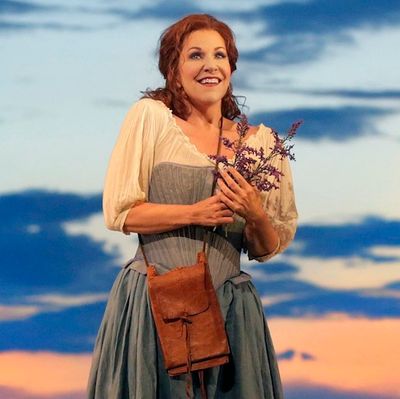
Joyce DiDonato belongs to that elite club of performing artists who get ovations simply for stepping onstage, before they’ve even uttered a sound. Then she proceeds to earn the applause. Witnessing DiDonato sing, you sense that she has no fear and no desire to be anywhere but in that scene, letting her voice leap, soar, plummet, and ricochet. Notes fly from her throat like tiny baseballs from a hyperactive pitching machine, landing exactly where she aims. Her timbre stays constant as she glides to the top of her range and down again, or hops nonchalantly from a murmur to a blast and back. This technical ease is a tool, not a goal, though, and she puts it at the service of the score, so that you don’t have to hack through a crust of mannerisms and ego to get at the music. If DiDonato has a weakness, it’s that she makes a character’s helplessness or desperation hard to believe. Anyone who can sing like that must surely have her life under control.
In theory, the Metropolitan Opera knows what to do with a phenomenal singer in her prime: mount a gorgeous new production of whatever she most wants to sing. I would say that you can’t go wrong, except that in this case, the Met has done its damnedest. For its first-ever performances of Rossini’s La donna del lago, which is based on Walter Scott’s verse saga The Lady of the Lake, the company plumped for a staging so meager that it barely exists at all. Paul Curran originally created it for the Santa Fe Opera’s outdoor house, where polychrome hills and Wagnerian sunsets can stand in for just about any mythic landscape, including Scott’s brooding highlands. At the Met, instead of sky, we see a screen, where projected clouds preen in high definition while cast and chorus tread a makeshift moor studded with plug-in flowers. The sides of the stage lurk in the shadows, trying to hide the absence of sets. Curran saves his showbiz powder for the final scene, which flares in a puff of glitz and gilt. (Actually, he does produce one other theatrical flourish: a trio of burning crosses, Scott’s unwitting gift of symbolism from the clans to the Klan.) But never mind this afterthought of a production. So long as DiDonato is Elena, she could be wearing a hospital gown and singing on a totally barren stage and she would still turn La donna del lago into her own beguiling spectacle.
The opera is a Scottish-Italian potboiler, full of lovestruck thanes, kilted rebels killing, cooing crowds of lasses, and a sentimental king. We’ll tolerate the silliness if that’s what it takes to generate such an exuberant geyser of music. Rossini, almost alone in the history of opera, infused even his tragic scores with bubbling, volcanic joy, expressed in galloping rhythms, oomp-chuck accompaniments, and melodies that go twirling through the hall like Roman candles. DiDonato shares that glee. Her gloomiest moments contain within them the sheer euphoria of singing. The conductor Michele Mariotti, who grew up in Rossini’s hometown of Pesaro, must have been weaned on that lighthearted sensibility, too, because he leads a performance full of disciplined exuberance.
With or without DiDonato, La donna del lago is a lopsided opera, because the lake lady is surrounded by doting men: her father Duglas, the blustering warlord Rodrigo, Giacomo (that’s King James to you) who is slumming incognito on rebel turf, and the doughty lover-boy Malcolm — the only one whose adoration she returns. Rossini balances the cast by making Malcolm a kilt role, sung by a mezzo-soprano in halfway drag. Daniela Barcellona squares her broad shoulders, does a creditably masculine stomp, and sings with delicacy and muscle. John Osborn, as Rodrigo, has the thankless task of batting high Cs back and forth with Juan Diego Flórez, whose airborne elegance makes it difficult for colleagues to keep up. If all this sounds more like a contest than an ensemble effort, it’s because Rossini wrote it that way. The rivals compete in vocal bravura, but the game is fixed and the first notes give away the ending. James appears in commoner’s mufti, but reels off coloratura passages with such florid aristocratic bravado that he immediately undermines his disguise. This guy’s no deer hunter. At the end of the act, Rodrigo strides onstage blaring Eccomi a voi, miei prodi (“Here I am, my brave followers”), and Rossini has laid so many vocal booby traps that even when the tenor gets through the aria with panache, as Osborn did, we sense his character is doomed.
Wisely, Rossini senses that the audience cares more about Elena than about any of these hapless chest-beaters, which means that just before the curtain comes down, it’s DiDonato, tossing out vocal sparklers and high-note confetti, who gets the final word: felicità.
La Donna del lago is at the Metropolitan Opera through March 14.





